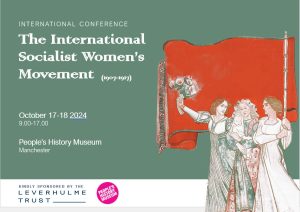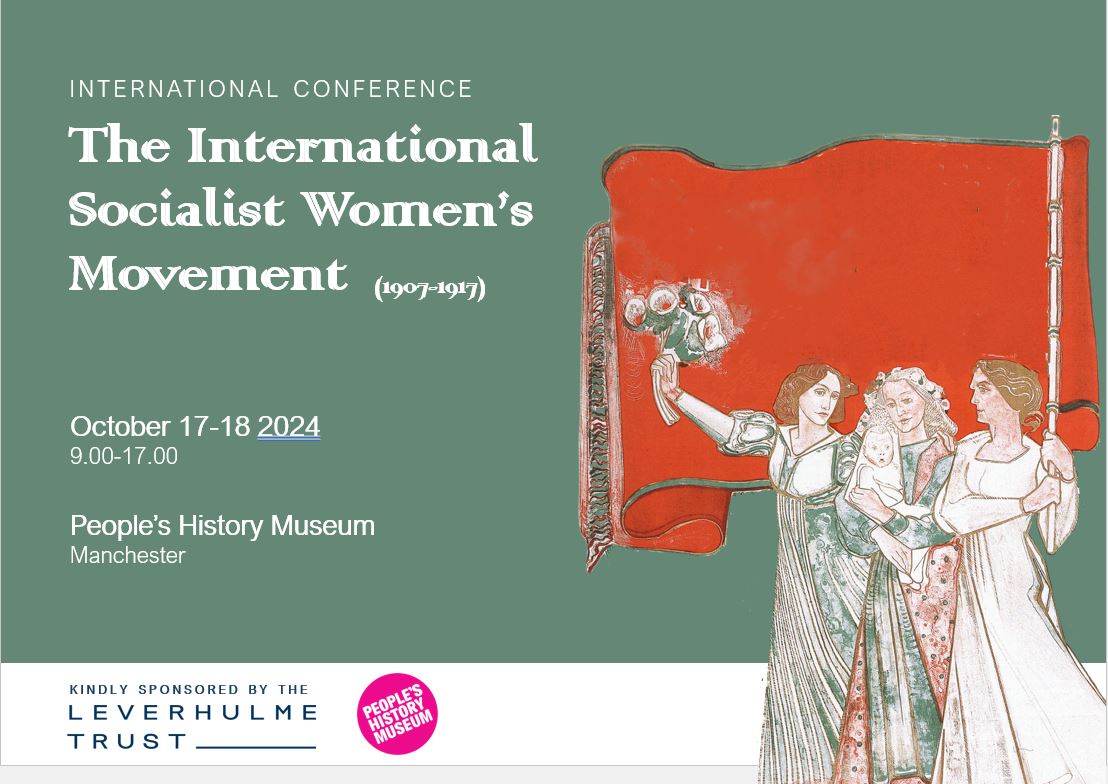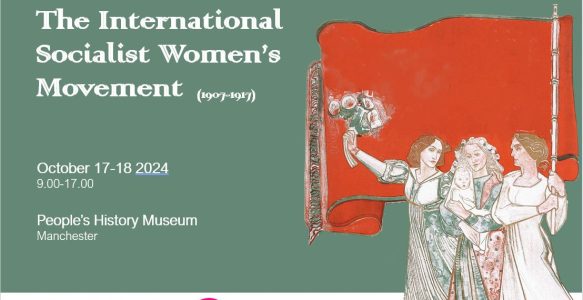
The People’s History Museum in Manchester was host to a truly historic event on Thursday 17 and Friday 18 October 2024, namely the first international specialist conference on the history of the pioneering International Socialist Women’s Movement (1907-1917). At its height, this movement organized hundreds of thousands of women within the political-strategic framework of the mass parties of International Socialism, often known as the ‘Second International’ (1889-1914). Mainly focused within Europe, this movement was not only at the cutting edge of winning many of the economic, socio-political and welfare rights and reforms that women – and men – take for granted within many states today. At its Second Congress in 1910 it also voted to establish International Women’s Day, which was conceived as a cross-border political demonstration for universal suffrage – ie ‘one person, one vote’ – regardless of sex or property distinctions.
This is not the place to provide an overview of the papers themselves or the fruitful discussion surrounding them. My conference notes and questions run to several pages, and I am sure I am not the only one who scribbled so much down. The attached timetable should give a flavour of what was discussed by those attending, who came from 12 different countries.
Three recurring themes stuck out for me as the conference organizer. First, the efforts of the organized women to find their voice within their political parties, which took various forms at various times, and which was also dependent on their legal position as women activists within their respective states. Second, the fascinating ideological and personal points of contact between the ISWM in countries as varied as Austria, Italy, Romania, Russia, Serbia and the USA. And third, the extent to which, and with what success, the strategy of a ‘clean break’ from the ‘bourgeois women’s movement’ that was developed within the German women’s movement – by far the largest – was replicated in other countries.
All the while, longstanding divisions around the relationship between socialism, Marxism and feminism were broached from a variety of different perspectives. Given that these discussions were informed by new research into largely ignored source materials from the time, these debates were also fresh and exciting. Moreover, they tapped into a modest yet significant upturn of interest in radical social women’s organization in the nineteenth and twentieth centuries that, following decades of distortion and neglect in Cold War Historiography, will hopefully continue into the future. Not least because they relate to the issue of whether, and to what extent, Marxist historiography can be enriched by other trends such as feminism, post-Colonialism and so on.
The high quality and intensity of the discussions at the conference and those who attended on Zoom will find reflection in the volume of conference proceedings, which will mark a milestone in international cooperative research into this inspiring chapter of women’s and working-class history. Such efforts are significant in that they counter the now largely dominant neo-liberal notion that the rise and spread of capitalism somehow inherently leads to civil rights and democracy for men and women alike. To this end, the conference launched an informal network of those attending and is now actively seeking a publisher for the proceedings: either in the form of a stand-alone book or as a special issue of an academic journal. With few exceptions, many participants find themselves as precarious ‘early research’ careers and it is hoped that our plans will help them to become established in their careers to produce more exciting research within and beyond academia.
I would like to thank all the participants for presenting their research, their openness and their contributions to the animated discussions that, as an aside, were fully in keeping with the spirit of the ISWM. On their behalf, I would all like to thank the technician, Oli, for taking care of the audio-visual aspects of the conference, as well as recording it, and Ollie, who gave us a ‘socialist tour of Manchester’ that seemed to leave no stone unturned and familiarised us all with Friedrich Engels’s Condition of the Working Class in England.
Last but certainly not least, I would like to thank the Leverhulme Trust, which generously funded this groundbreaking conference as part of my Leverhulme Early Career Fellowship at the University of Leeds. Without this funding, and without the cooperation of my former colleagues at the University of Leeds Research and Innovation Team – chief among them Alice Potter and Ann Goodman – this conference would not have taken place. This conference was a highlight not only of the Fellowship but my academic career more generally.
Ben Lewis; Sheffield, 20 October 2024
———————————-
Opening Session
Ben Lewis
Introduction and Opening Remarks
Frank Jacob
The Women’s International Council of Socialist and Labour Organisations and the Social Democratic Press
Minja Bujaković
The International Socialist Women’s Movement: A Genealogy of a Network
Session 2
Andrea Pérez Fernández
All art is political art: Luxemburg, Märten and Zetkin on proletarian culture
Rida Vaquas
As Mothers and as Comrades: The ISWM’s Role in the Education of the Proletarian Youth in Germany
Isidora Grubački
Zenski list (Women’s Paper, 1913) and Jednakost (Equality, 1910-1914): A comparison of two social-democratic women’s papers in Ljubljana and Belgrade
Session 3
Alexandra Ghit
ISWM in the East, the East in the ISWM: Links between radical socialist women in the Kingdom of Romania and activists from the ISWM (1910-1926)
David Guerrero Martín
Male domination against women’s participation: the feminist discourse on organizational autonomy within the Socialist Party of America (1900-1920)
Ottavia dal Maso
The Socialist Women’s Movement in Italy
Session 4
Ankica Čakardić
Rosa Luxemburg and the ISWM
Andrew Bonnell (Zoom)
Robert Michels and the ISWM
Ben Lewis
Die Gleichheit and the ISWM
Session 5
Velia Luparello (Zoom)
The Origins of the Socialist Women’s Movement in Austria
Anne McShane
Rabotnitsa and the Socialist Women’s Movement
Speakers:
Andrew Bonnell is an Associate Professor in History at the University of Queensland, specialising in modern German and European history, and in particular on the German labour movement. He has written or edited nine books, most recently Red Banners, Books and Beer Mugs: The Mental World of German Social Democrats, 1863-1914 (Brill, 2021) and Robert Michels, Socialism, and Modernity (Oxford University Press, 2023). He is on the editorial collective of the Rosa Luxemburg Complete Works edition. He is also Branch President of the National Tertiary Education Union at the University of Queensland and also that union’s National Vice-President (Academic)
Minja Bujakovic is a fourth-year PhD researcher at the European University Institute in Florence, Italy. Her research focuses on the history of left-wing women’s activism in the early 20th century, with an emphasis on the Communist Women’s Movement during the Interwar Period. She examines the networks of contact and collaboration among socialist and communist women, investigating how they sustained and promoted the development of international Socialist and Communist Women’s Movements between 1907 and 1935
Ankica Čakardić holds the Chair of Social Philosophy and Philosophy of Gender at the Faculty of Humanities and Social Sciences in Zagreb. Among the books she has written are: The Rebellious Mind: Essays in Radical Social Philosophy (2021), Like a Clap of Thunder. Three Essays on Rosa Luxemburg (2019) and Spectres of Transition. Social History of Capitalism (2019). She is a member of the editorial board of Historical Materialism: Journal of Critical Marxist Theory and The Complete Works of Rosa Luxemburg
Alexandra Ghiț is a ZARAH Research Affiliate at CEU. Currently, she is researcher in the History of Feminist Political Thought and Women’s Rights Discourses in East Central Europe 1929-2001 (HERESSEE) project at the University of Vienna, RECET Center. She was recently Fellow at Leibniz-Institut für Geschichte und Kultur des östlichen Europa (GWZO), Leipzig, on a “Starting Research Grant” (January-April 2024).
Between February 2020 and July 2023, she was Postdoctoral Fellow in the project ZARAH : Women’s labour activism in Eastern Europe and transnationally, from the age of empires to the late 20th century (ERC Advanced Grant). Her research interests include women’s labour history (with a focus on twentieth century Eastern Europe), the history and sociology of social policy, the social history of state socialisms, the history of women’s social movements. Her first monograph, Welfare Work Without Welfare: Women and Austerity in Interwar Bucharest, is currently under review.
Alexandra has a Matilda Erasmus MA in Women’s and Gender History from CEU in cooperation with the University of Nottingham, and a BA in Political Science from Babes- Bolyai University in Cluj Napoca
Andrea Pérez Fernández holds a Ph.D. in Philosophy from the University of Barcelona (2023) with a thesis on Art and politics in Hannah Höch’s work during the Weimar Republic. She has recently edited and translated (with Isabel García Adánez) a selection of Höch’s and Lu Märten texts into Spanish (Tres Hermanas, 2023). She has published on women authors of the twentieth century, such as Simone Weil (Isegoría, 2022) and Rosa Luxemburg (Büchner, 2024; Res Publica, 2024). She is a member of the Philosophy and Gender Seminar (University of Barcelona) and of the SAFI interdisciplinary network
Isidora Grubački (Institute of Contemporary History) is a historian focusing on contemporary European history, specializing in the fields of transnational women’s history and intellectual history of feminism in the interwar period. Her doctoral dissertation, titled Political Transformations of Interwar Feminisms: The Case of Yugoslavia, has been submitted to Central European University in Vienna in 2023, with the defense date set for January 2024. She was a visiting researcher in various institutions in Ljubljana, Paris, Prague, Zagreb, and Cambridge, and has been involved in several research networks, including Cost Action Who Cares in Europe? and Intellectual History in East Central Europe. Since 2021, she works as a researcher at the Institute of Contemporary History in Ljubljana and is currently a member of the team of ERC project The History of Feminist Political Thought and Women’s Rights Discourses in East Central Europe 1929-2001 (HERESSEE), hosted at the University of Vienna
David Guerrero holds a cotutelle PhD in Sociology (University of Barcelona) and Philosophy (University of Groningen). He is substitute lecturer at the Faculty of Information and Audiovisual Media at the University of Barcelona, and works at the intersection between sociology of communication, intellectual history and political theory. His research revolves around the history and theory of expressive liberties in modern Western societies (free speech, religious toleration, freedom of thought…), paying particular attention to how the distribution of material and symbolic communication resources contributes to, or prevents, the realization of such expressive ideals. He is member of the editorial board of Sin Permiso. A list of selected publications can be found at: https://www.ub.edu/greecs/people/david-guerrero/
Frank Jacob is Professor of Global History at Nord Universitet, Norway. He is author or editor of more than 100 books and his recent publications include the monograph Revolution and the Global Struggle for Modernity, vol. 1: The Atlantic Revolutions (Anthem Press, 2024). Jacob also edited the works of Kurt Eisner and wrote numerous books and articles about Emma Goldman
Ben Lewis is Teaching Assistant for German at the University of Sheffield. He specialises in German intellectual and social history. He has taught German language, politics and history at King’s College London the Open University and the University of Sheffield, and was Leverhulme Early Career Fellow at the University of Leeds. In total, he has published six different books and translated several others. He is currently researching a book on the history of the German Social Democratic Party’s women’s magazine, Die Gleichheit (1892-1917). He sits on the Editorial Board for the English translation of Rosa Luxemburg’s Collected Works and is founder of the podcast and Patreon project, Marxism Translated
Velia Luparello is Assistant Professor in Contemporary History. She holds a PhD and a BA in History (Faculty of Philosophy and Humanities – National University of Córdoba, Argentina) specializing in the area of the History of International Socialism and Feminisms and Marxism in the 20th Century. She is also a postdoctoral fellow at CIECS-UNC-CONICET. She is author of the book The Trotskyists under Nazi Terror. A History of the Fourth International during World War II; and one of the editors and authors of the book Marxist Essays on the History of Socialism.
She is currently a member of the research project “Between Europe and America: Comparative History of International Socialism (1890-1973)”, and she is working on her postdoctoral research entitled “Women’s Work and Female Emancipation. A Comparative Study of Policies on the Women’s Question in Socialist Internationals during the 20th Century.” Her latest published article is on Clara Zetkin and the Socialist Women’s International, co-authored with Daniel Gaido
Ottavia dal Maso is a third-year PhD student in Social Sciences – curriculum: Political Sciences (XXXVIII cycle) at the University of Genoa, in co-supervision with the University of Côte d’Azur in Nice, with a research project titled ‘We do not have our own history: History of ideas and forms of struggle of Socialist and Communist women, 1911-1925’. It is a research that attempts to reconstruct, starting from the perusal of the first women’ss political newspapers, the practical and intellectual contributions of two groups of women, the socialists of Milan and the communists of Turin in the construction of a female political subject within the large mass parties of the left in Italy at the beginning of the 20th century. Between 2020 and 2021, Ottavia attended the Advanced Course in Critical Theory of Society at the University of Milano-Bicocca. In 2020, she obtained a double Master’s degree between Italy and France in Governmental Studies (University of Turin) and in Theories and History of Economy in society (University Lumière Lyon 2)
Anne McShane has been an active Marxist for many years, in Britain and now in Ireland. She is a human rights lawyer and represents asylum seekers. Anne completed a PhD in History and Politics at Glasgow University in 2019 on the work of the Zhenotdel (Women’s Department of the CPSU) in Soviet Central Asia. She also has a strong interest in the Socialist Women’s Movement and its leading figures. She has written on Rabotnitsa, the journal launched by Bolshevik women in 1914 and will present an analysis of its significance and connection to the International Socialist Women’s Conferences
Rida Vaquas is a senior editor at Oneworld Publications. She mainly writes about the Second International and the histories of German socialism and communism. Her translations can be found on Cosmonaut. She is also on the editorial collective of the Rosa Luxemburg Complete Works edition.

